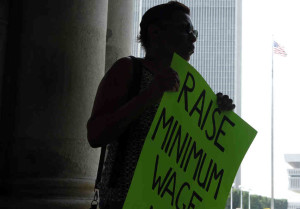 Here at Difficult Run, we just can’t get enough of the minimum wage. Yet, that seems to be because there is so much good stuff to post about it. The Economist, for example, has a recent article that looks at three different studies regarding the long-term effects of the minimum wage:
Here at Difficult Run, we just can’t get enough of the minimum wage. Yet, that seems to be because there is so much good stuff to post about it. The Economist, for example, has a recent article that looks at three different studies regarding the long-term effects of the minimum wage:
-
In the first Isaac Sorkin of the University of Michigan argues that firms may well substitute machines for people in response to minimum wages, but slowly…Mr Sorkin crunches the numbers, using a model of the American restaurant industry in which companies choose between employees and machines. He investigates the effect of a permanent (ie, inflation-linked) increase in the minimum wage and shows that the tiny short-run effects on employment normally seen are fully consistent with a long-run response over 100 times larger. The lack of evidence for a big impact on employment in the short term does not rule out a much larger long-term effect.
-
In a second paper, written with Daniel Aaronson of the Federal Reserve Bank of Chicago and Eric French of University College London, Mr Sorkin goes further, offering empirical evidence that higher minimum wages nudge firms away from people and towards machines. The authors look at the type of restaurants that close down and start up after a minimum-wage rise. An increase in the minimum wage seems to push some restaurants out of business. The eateries that replace them are more likely to be chains, which are more reliant on machines (and therefore offer fewer jobs) than the independent outlets they replace. This effect has not been picked up before because the restaurants which continue to operate do not change their employment levels, so the jobs total does not shift much in the short run.
-
The third cautionary paper is from Jonathan Meer of Texas A&M University and Jeremy West of the Massachusetts Institute of Technology…Their results suggest that a 10% increase in the minimum wage, made permanent by linking it to inflation, could cut job growth by 0.3 percentage points a year. Over a long period, this could amount to a very large difference indeed, though the authors stress that such long-run extrapolations are difficult given the limited experience of such permanent changes. Worryingly, the effects on jobs growth they see are concentrated among people under 25, and those without a degree. These are vulnerable groups who risk being locked out of the labour force for good.
Give them a read.
1 thought on “The Long-Term Effects of the Minimum Wage”
Comments are closed.